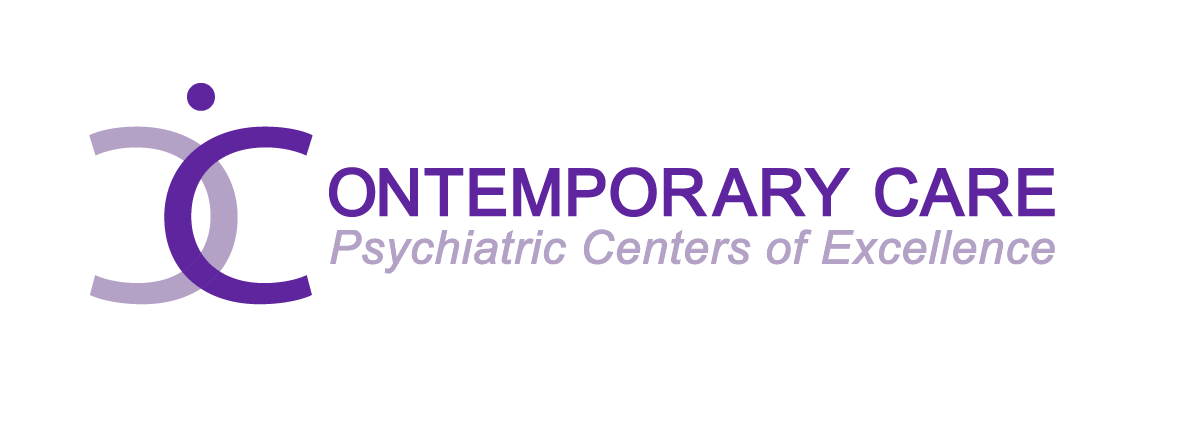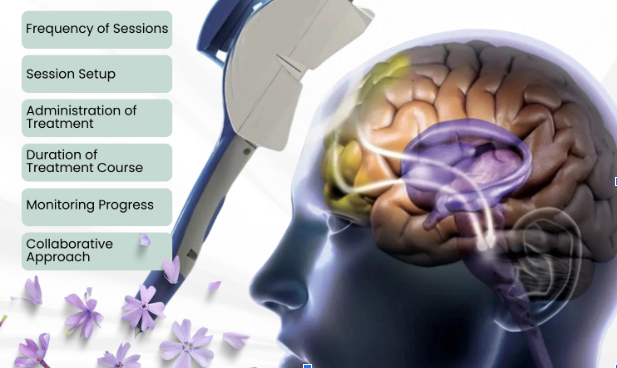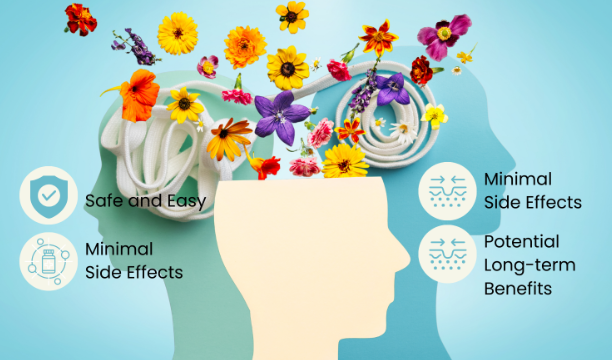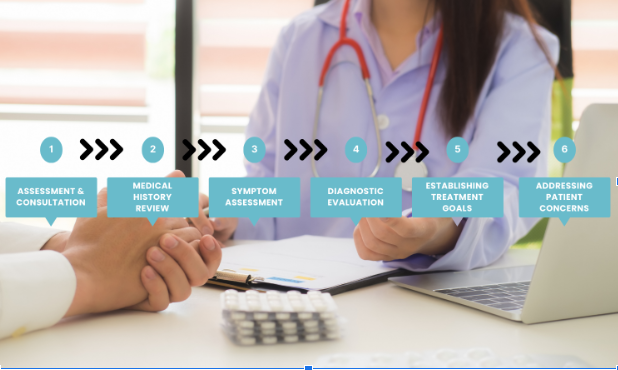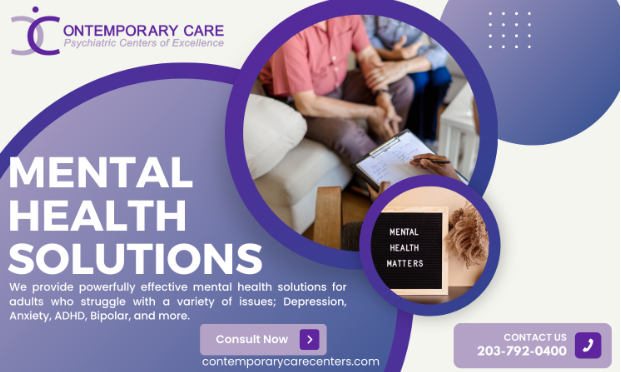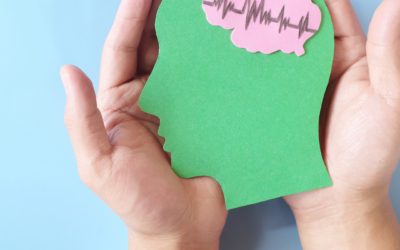Depression is a mental health condition characterized by persistent feelings of sadness, hopelessness, and a loss of interest in activities. It can affect how a person thinks, feels, and behaves, and may also lead to physical symptoms such as changes in appetite or sleep patterns. Depression can vary in severity, from mild to severe, and can interfere with daily life and functioning. It’s essential to recognize that depression is a common and treatable condition. Studies show that Transcranial Magnetic Stimulation (TMS) is safe and works well for many people with depression. It targets specific brain areas to improve mood without causing many side effects. Because it’s gentle and doesn’t involve surgery, it’s a good choice for people who haven’t found relief with other treatments.
TMS offers hope for individuals struggling with depression by providing a non-invasive treatment option. TMS is a therapy that uses magnetic fields to stimulate certain brain areas. This stimulation is believed to help regulate mood and alleviate symptoms of depression. Unlike medications, which work throughout the body, TMS targets specific regions of the brain associated with mood regulation. It is often considered a promising alternative for treating depression when other methods haven’t been effective. Having a comprehensive depression treatment plan that includes TMS therapy can offer individuals a personalized approach to managing their symptoms and improving their quality of life.
Understanding Transcranial Magnetic Stimulation
TMS is a non-invasive procedure that uses magnetic fields to stimulate nerve cells in specific brain regions. It targets areas associated with mood regulation, such as the prefrontal cortex. Magnetic pulses generated during TMS create small electrical currents in the brain, impacting mood and other mental health disorders and conditions.
Various TMS Techniques
Transcranial Magnetic Stimulation (TMS) includes various methods that target specific brain areas to ease depression symptoms. These methods are:
- Repetitive TMS (rTMS): This method delivers many magnetic pulses over time. It aims at brain regions linked to mood regulation and can effectively lessen depression symptoms for many people. rTMS is well-studied and considered safe and helpful.
- Theta Burst Stimulation (TBS): TBS gives quick bursts of magnetic pulses to change brain activity. It aims to make treatment sessions shorter while still relieving depression symptoms. TBS is seen as a handy option for TMS therapy, especially for those looking for different ways to treat depression.
Safety and Effectiveness of TMS for Treating Depression
TMS is considered a safe treatment option for depression, with minimal side effects reported in most cases. The most common side effects include mild headache or discomfort at the site of stimulation, which typically subside shortly after treatment.
Research studies have shown that TMS can be effective in reducing symptoms of depression, particularly for individuals who have not responded well to traditional antidepressant medications. Many patients experience significant improvements in mood and overall well-being following a course of TMS therapy.
TMS is non-invasive and does not require anesthesia, making it a convenient option for individuals seeking alternative treatments for depression at other treatment facilities and centers specializing in depression. Additionally, TMS does not cause systemic side effects commonly associated with antidepressant medications, such as weight gain or sexual dysfunction.
Before undergoing TMS therapy at depression treatment centers, patients typically undergo a thorough evaluation by a mental health professional to determine if they are suitable candidates for treatment. This evaluation may include a comprehensive medical history, psychiatric assessment, and discussion of treatment goals and expectations.
TMS offers a promising approach to treating depression, providing individuals with a safe, effective, and well-tolerated option for improving mood and quality of life as part of a comprehensive depression treatment plan.
Benefits of TMS for Depression
Transcranial Magnetic Stimulation (TMS) is a treatment for depression that’s gentle and doesn’t need surgery. Here’s more about why it’s a good choice:
Safe and Easy: TMS therapy is non-invasive, it does not require surgery or anesthesia. This makes it a safe and comfortable option for individuals seeking treatment for depression, whether they visit a depression treatment, depression rehab center, or other healthcare facility.
Minimal Side Effects: Compared to medicines, TMS doesn’t usually cause big problems. Some people might feel a little headache, but it’s not a big deal. Plus, there’s no need to worry about things like addiction or weight gain that can come with some medications. Treatment centers for depression often offer TMS as part of their comprehensive depression treatment plan.
Success Rates: Studies show that TMS helps with depression recovery, and a lot of people with depression feel better. Even after they stop getting TMS, many people still feel good for a long time. It can lift the cloud of depression and help people get back to enjoying life again. Many depression treatment centers incorporate TMS into their treatment programs and plans due to its high success rates.
Potential Long-term Benefits: For people who haven’t felt better with other treatments, TMS is like a light at the end of the tunnel. It gives them a chance to feel better and live a happier life. Knowing that there’s a treatment that works for them can bring a sense of hope and relief, especially when included in a personalized depression treatment plan.
Who Can Benefit from TMS?
- Individuals diagnosed with depression who have not responded well to antidepressant medications or therapy.
- People seeking a non-invasive treatment option for depression at specialized treatment centers.
- Patients are looking to avoid the side effects associated with traditional antidepressant medications at the dedicated treatment center.
- Individuals with depression prefer a targeted approach to treatment that focuses on specific areas of the brain, as offered in the depression treatment plan incorporating TMS therapy.
Factors Influencing the Effectiveness of TMS Treatment
Severity of Depression: TMS may be more effective for individuals with mild to moderate depression compared to severe depression.
Treatment Duration: The number of TMS sessions and the frequency of treatments can impact the effectiveness of therapy outlined in the depression treatment plan.
Individual Response: Response to TMS therapy can vary among patients, with some experiencing significant improvement, while others may not respond as well to treatment at depression treatment centers.
Treatment Adherence: Consistent attendance and adherence to the recommended treatment schedule can influence the outcome of TMS therapy in the depression treatment plan.
Considerations for TMS Therapy
- Presence of metal implants or objects in the head or neck area, as they may interfere with the magnetic field generated during TMS.
- History of seizures or epilepsy, as TMS therapy, may increase the risk of seizures and requires careful monitoring at treatment centers for depression.
- Active substance abuse or dependence, such as TMS, may not be as effective in individuals with substance use disorders undergoing depression treatment.
- Pregnancy, as the safety of TMS during pregnancy, has not been well-established and should be discussed with a healthcare provider when creating a depression treatment plan.
By considering these factors, healthcare providers can determine the suitability of TMS therapy for individuals seeking treatment for depression at specialized depression treatment centers.
The TMS Treatment Process
Initial Assessment and Consultation At Depression Treatment Center
During the initial assessment and consultation at depression treatment centers, individuals seeking TMS therapy undergo a thorough evaluation to determine the suitability of this innovative treatment for their specific condition. This crucial phase of psychiatric evaluation involves several key elements:
Medical History Review
The healthcare provider conducts a detailed review of the patient and family therapy and one’s medical history, including any past or current mental health diagnoses, medications, and treatments. Understanding the individual’s health background helps tailor the TMS therapy to their unique health insurance needs.
Symptom Assessment
The patient discusses their symptoms and experiences related to depression. This open dialogue allows the healthcare provider to gain insight into the nature and severity of the depressive symptoms, guiding the development of a targeted depression treatment plan.
Diagnostic Evaluation
In some cases of chronic depression, additional diagnostic assessments, such as psychological testing or imaging studies, may be recommended to further understand the individual’s mental and behavioral health or condition and identify any underlying factors contributing to depression.
Establishing Treatment Goals
The consultation serves as an opportunity to collaboratively establish treatment goals. By understanding the patient’s expectations and desired outcomes, the healthcare provider can customize the TMS therapy plan to align with these objectives.
Addressing Patient Concerns
Patients have the chance to express any concerns, ask questions, and discuss their expectations regarding TMS therapy. This open communication fosters a supportive environment in mental health treatment programs and ensures that individuals feel informed and comfortable with the proposed treatment.
Treatment Sessions and Duration At Depression Treatment Center
At treatment centers for depression, TMS therapy typically involves a series of outpatient treatment sessions conducted over several weeks. Here’s what to expect during the treatment sessions and an overview of the duration:
Frequency of Sessions
TMS therapy usually consists of sessions administered on consecutive weekdays, with each session lasting approximately 20 to 30 minutes. The frequency and duration of the sessions may vary based on individual treatment plans and responses to individual therapy alone.
Session Setup
Before each session, the patient is comfortably seated in a specialized chair or recliner. The healthcare provider positions the TMS coil device precisely over the targeted area of the scalp, ensuring accurate delivery of magnetic pulses to the brain regions associated with depression.
Administration of Treatment
During the session, the TMS device delivers repetitive magnetic pulses to the targeted brain areas, stimulating neural activity and promoting mood regulation. Patients typically experience a tapping or clicking sensation on the scalp during the treatment, but it’s generally well-tolerated and does not cause significant discomfort.
Duration of Treatment Course
A typical course of TMS therapy consists of daily sessions over four to six weeks, totaling approximately 20 to 30 sessions. However, the specific duration may be adjusted based on individual response to treatment, symptom improvement, and therapeutic goals.
Monitoring Progress
Throughout the treatment course, healthcare providers closely monitor the patient’s progress and response to TMS therapy. Regular assessments, including symptom monitoring and clinical evaluations, help track changes in mood and functioning in inpatient treatment, guiding adjustments to the treatment plan as needed.
Collaborative Approach
Treatment centers for depression emphasize a collaborative approach, with healthcare providers and support groups working closely with patients to optimize treatment outcomes. Open communication, feedback, and ongoing support are integral components of the treatment process, fostering a supportive and empowering environment for individuals undergoing TMS therapy.
Monitoring Progress and Adjusting Treatment Plans
Monitoring progress and adjusting treatment plans are essential components of the comprehensive care provided at the depression treatment center. These facilities specialize in residential treatment centers offering personalized, treatment options and plans tailored to each individual’s unique needs and circumstances. Here’s how they ensure that patients receive optimal care:
Regular Monitoring
Patients undergoing TMS therapy at depression treatment centers are regularly monitored to track their progress and assess their response to the treatment program. This monitoring includes periodic evaluations of mood, symptoms, and overall well-being to gauge the effectiveness of the treatment plan.
Collaborative Approach
Treatment plans at depression treatment centers are developed collaboratively between the patient and a multidisciplinary treatment team made of healthcare and mental health professionals together. This team may include psychiatrists, psychologists, therapists, and TMS specialists who work together to design a comprehensive depression treatment plan that addresses the individual’s specific needs.
Individualized Care
Treatment centers for depression recognize that every patient is unique, and their depression treatment programs and medication management plans are tailored to reflect this individuality. Factors such as the severity of depression, treatment history, and personal preferences are taken into account when designing the depression treatment plan to ensure that it aligns with the patient’s goals and objectives.
Flexibility and Adaptability
Treatment plans are designed to be flexible and adaptable to accommodate changes in the patient’s condition or treatment response. If necessary, adjustments can be made to the treatment plan, such as modifying the TMS protocol, introducing adjunctive therapies, or addressing any emerging issues or concerns in inpatient care.
Continued Support
Throughout the treatment process, patients receive ongoing support and guidance from the healthcare team at the residential treatment center. This includes regular check-ins, therapy sessions, and educational resources to help patients navigate their depression treatment plan and achieve their treatment goals.
Comparing TMS with Other Depression Treatments
Comparing TMS with Antidepressant Medications
- Mechanism of Action: Unlike antidepressant medications, which alter neurotransmitter levels, TMS therapy delivers magnetic pulses to specific brain regions associated with mood regulation.
- Side Effects: Antidepressants may cause side effects like nausea or weight gain, while TMS therapy typically has fewer side effects, such as mild headache or scalp discomfort.
- Treatment Response: TMS therapy can be effective for individuals who haven’t responded well to medications, providing an alternative treatment option as part of their depression treatment plan.
TMS vs. Electroconvulsive Therapy (ECT)
- Procedure: Unlike ECT, which induces controlled seizures with electrical currents, TMS therapy stimulates the brain without causing seizures.
- Side Effects: ECT may lead to memory loss or confusion, whereas TMS therapy has fewer cognitive side effects and doesn’t require hospitalization.
- Indications: ECT is usually for severe depression, while TMS therapy is suitable for mild to moderate depression or as a treatment for those who haven’t responded to other therapies.
TMS as a Complementary or Alternative Treatment Option
- Adjunctive Therapy: TMS can enhance the effects of antidepressants or therapy when used together.
- Non-Pharmacological Option: It’s a good choice for individuals who prefer non-medication treatments or worry about medication side effects.
- Personalized Approach: Depression treatment centers for depression may offer TMS therapy as part of a personalized treatment plan tailored to each individual’s needs.
Turn Your Life Around Today by Calling Contemporary Care Centers!
Experience the transformative power of TMS therapy at Contemporary Care Centers. Our state-of-the-art facilities and compassionate team are dedicated to your mental health challenges, providing personalized depression treatment plans that incorporate innovative therapies like transcranial magnetic stimulation. Take the first step towards a brighter tomorrow by scheduling a consultation group therapy call with us today. Let us help you reclaim your mental well-being and embark on a journey towards lasting recovery.
